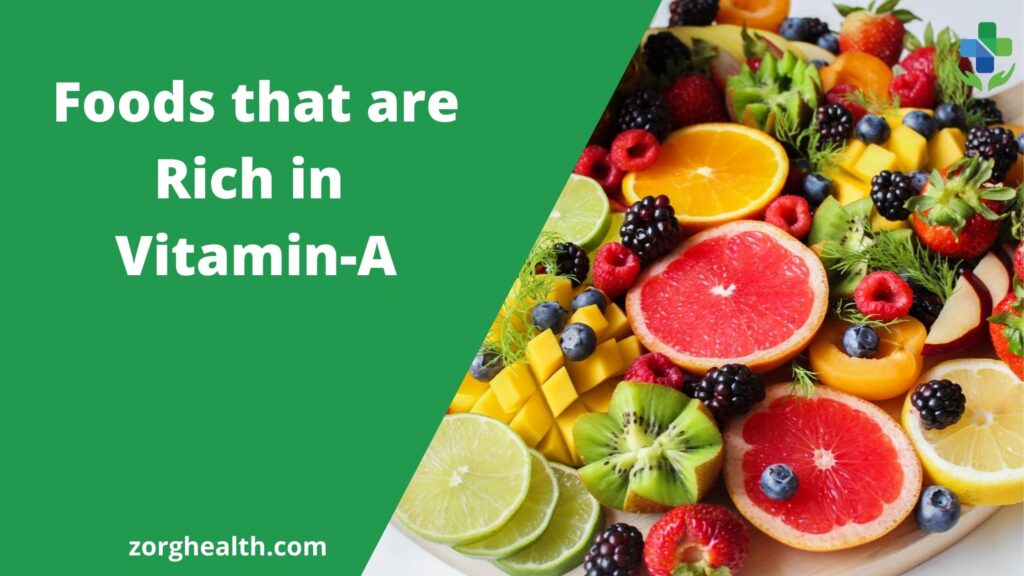Vitamin A is a fat-soluble vitamin. Vitamin A (also called retinol, retinoic acid) is a nutrient important to vision, growth, cell division, reproduction, and immunity. Vitamin A also has antioxidant properties. It is also necessary for bone maintenance and reproduction. Vitamin A deficiency can lead to blindness and that’s why you should eat a balanced diet with foods that are rich in vitamin A.

What is Vitamin A made of?
Vitamin A is an important nutrient for many organs in our body. It is a group of unsaturated organic compounds that includes retinol, retinol, retinoic acid, and several provitamins A carotenoids. There are two types of Vitamin A-
- Preformed vitamin A, which comes from animal sources.
- Provitamin A comes from plants, fruits, and vegetables.
What is Vitamin A deficiency?
- NIGHT BLINDNESS
Vitamin A deficiency is a lack of vitamin A in blood and tissues. It is common in poor countries, especially among children and women of reproductive age, but is rarely seen in more developed countries. Nyctalopia or night blindness is one of the first signs of vitamin A deficiency. Night blindness is the difficulty for the risk to adjust to dim light. Affected individuals have poor vision in the dark darkness but seeing is normally when adequate light is present.
2. INFECTION
With a vitamin-deficient diet, infections and diseases are common in many developing countries. Infection depletes vitamin A reserves which in turn makes the affected individuals most suspicious to further infection. Vitamin A deficiency is associated with a variety of infectious diseases including diarrhea and respiratory diseases, measles, and human immunodeficiency virus type 1(HIV-1) infection.
Why is vitamin A important to us?
Vitamin A comes under the category of fat-soluble vitamins and is naturally present in many foods. Vitamin A is needed for normal vision, functioning of the immune system, and reproduction. vitamin A also helps the heart, lungs, kidney, and other organs to work properly. Vital roles of Vitamin A-
- In enhancing immune function
- Eyesight- helps in night vision, as it is an important ingredient in the cells of the retina.
- Cellular maintenance of vital organs like the heart and lungs.
What are the foods that are rich in vitamin A?
Liver and fish oils have a very high concentration of preformed vitamin A, apart from liver and fish oils, milk and eggs also have some provitamin A. Some dietary provitamin A comes from leafy green vegetables, tomato products, orange and yellow vegetables, fruits, and some vegetable oils.
ANIMAL-BASED FOODS
- Beef liver: This is one of the most nutrient-dense organ meats available. It supports the health of the eyes and reduces the risk of various diseases Alzheimer’s diseases, arthritis and many more.100g of liver provides 1,049 % of the recommended daily value of vitamin A.
- Cod liver oil: Cod liver oil should only be purchased if it is extra virgin and has not been heat-treated. 1 teaspoon of this provides 150% of your daily value vitamin A. It also contains vitamin D which boosts mood and AIDS and Weight Loss.
- Eggs: Retinal can also be found in eggs especially with the yolk. 1 large egg provides 17% of your daily value vitamin A. Eggs also contain protein, natural fat, B6, B12, zinc, iron, and copper.
- Butter: Natural grass-fed butter is one of the healthiest foods that you can consume. Look for a brand that has not been blended with veggies oils and margarine. 1 tablespoon contains 11% of your daily value of Vitamin A. It also contains vitamin D, E, K2.
- King mackerel: This particular fish provides 28% of your daily value of Vitamin A in the active form of retinol. It is also a rich source of Omega 3 fatty acids which lower inflammation throughout the entire body eating fish is a great way to reduce eye strain and headaches.
- Cheddar Cheese: Look for a good quality cheese from grass for cows. 1 slice of cheddar provides 10% of your daily value of Vitamin A. Some people have an intolerance to tell if this is the case stick to the fish and meat-based products.
PLANT-BASED FOODS
There are also plant-based foods that contain a different version of vitamin A. This is called Beta-carotene, and is in fact a “Provitamin A”. This is not the active form of Vitamin A. The body has to convert this into the active form known as retinol. Unfortunately, only 3-6 % of the intake of Beta carotene is converted into the active form.
- Mango: 1 medium-sized mango contains 20% of the daily value of provitamin A. This is one of the most popular fruits in the world which helps to hydrate the body and supply Vitamin C for the system.
- Cooked Kale: Kale is one of the richest nutrients dense superfoods on the planet. These leafy green vegetables protect the DNA from mediation and damage. It also contains antioxidants and one cup supplies 98% of your daily value of provitamin A.
- Winter squash: Squash vegetables are excellent for balancing hormones and supplying Vitamin B2, B3, Folate, Vitamin K, Potassium, and Magnesium. 1 cup of cooked squash or pumpkin contains 62% of your daily value of provitamin A.
- Collard greens: 1 cup of cooked collard contains 80% of your daily values of provitamin A. These are some of the healthiest leafy green vegetables which have been shown to reduce the risk of cancer and heart disease by detoxifying the body.
- Carrot: Carrot has been used for many years for those on a plant-based diet to boost health. Some people use this to fight cancer in the form of juice. 1 medium carrot contains 44% of the daily value of Provitamin A, along with a host of other important nutrients.
- Sweet Potato: 1 cup cooked sweet potatoes contains 204% of the percent of your daily value of provitamin A.
Now that you know the variety of foods that are rich in vitamin A, be sure to eat a mixture of the different foods which are high in vitamin A.
